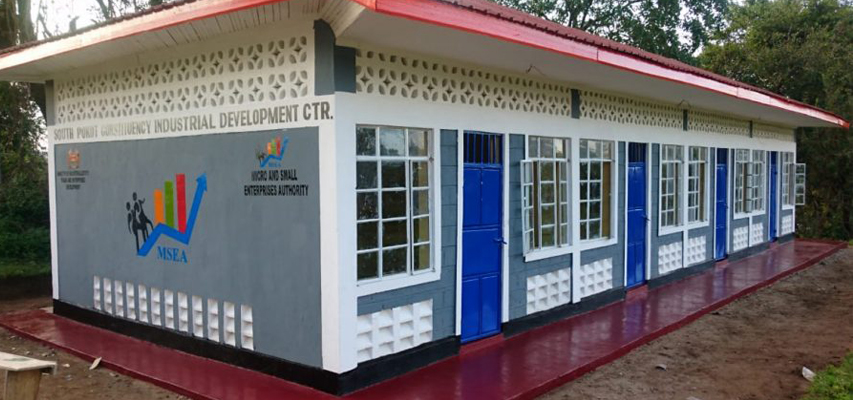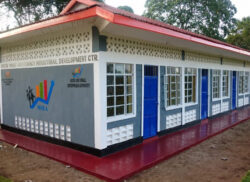Development of constituency industrial development centres

The main activity under this sector was the construction and equipping of Constituency Industrial Development Centres (CIDCs) in the 210 constituencies to provide worksites and tools for the youth to pursue gainful employment. A total of 188 constituencies out of the 210 identified land for the construction of CIDCs. The Ministry of Industrialization and Enterprise Development completed construction of 139 Constituency Industrial Development Centres in various constituencies while construction works for the remaining 49 centres are at various stages of implementation.
Two CIDCs: Kiambaa and Kitui Central have been equipped and are ready for launching. Management agreement contract has been signed between the Ministry of Industrialization and Enterprise Development and KIE to manage some of the CIDCs. Out of these, 47 CIDCs have been identified for upgrading into industrial parks in each of the counties. In conclusion, Kenya prepares to start oil exportation in the second half of 2023, as-a- matter-of-urgency; the government is establishing a framework that promotes implementation of sound fiscal, environment and compensation policies as well as enhancing good governance. Observing the experiences of Botswana, it is critical that Kenya gets it right from the beginning by adopting a combination of sound fiscal policy, environment, compensation and good governance as essential ingredients to avoid the resource curse phenomenon.
Transformation of the Kenya industrial training institute
The Government is transforming KITI to make it a center of excellence that provides quality training to support development of manufacturing and industrial development. Located on a 40-acre piece of land along Nakuru–Solai Road, 3kms from Nakuru town. KITI gives provides students with technical and entrepreneurship skills for self-employment. It trains artisans, craftsmen, technicians, engineering graduates, engineers and entrepreneurs to work in the existing industries and for self-employment.
Also trained are middle level managers for the industrial sector to carry out research in projects and products that can accelerate rural industrialisation. The institute also offers shorter courses for specific groups or clients (tailor made courses to meet client’s training requirements). The institute has 8 training departments most of which have adequate training space in form of workshops and classrooms.
SMEs competitiveness project
This project was initiated to increase productivity and employment in Micro, Small and Medium Enterprises (SMEs) through three components namely: access to finance, improved business environment and strengthened enterprise skills and markets linkages to meet the demands of SMEs. The project developed new financial products for SMEs such as Asset Financing, receipt warehousing, weather insurance, credit referencing, deposit taking by Micro Financial Institutions and Cooperative Societies.
Under the strengthening enterprise skills and market linkages component, over 47 pilot projects were undertaken in the cotton, coffee, leather and pyrethrum value chains, thereby increasing productivity and competitiveness through implementation of Good Agricultural Practices (GAPs) and certification of co-operatives. The pilot value chain matching grant, through the various Apex committees created in the identified value chains resulted into establishment of the Cotton Development Authority (CODA) and the Kenya Leather Development Council.
The Kenya industry and entrepreneurship project
The Kenya Industry and Entrepreneurship Project (KIEP) is a US$50 million project that will be implemented by the Ministry of Industrialization, Trade and Enterprise Development (MoITED) with support from the World Bank Group over the next six years between 2019-2024. KIEP aims to increase innovation and productivity in select private sector firms in Kenya by strengthening the private sector (including startups, SMEs, incubators, accelerators, technology Bootcamp providers, etc.) through financial grants and technical assistance. KIEP is fully aligned with Kenya’s Vision 2030 of transforming the country into a newly industrialized and globally competitive middle-income country.
The project aims to deliver this industrialization agenda by strengthening the entrepreneurship ecosystem, increasing firm-level innovation and productivity, and developing technically skilled talent in the country. Through support to select, high-potential SMEs, particularly in sectors such as manufacturing and agribusiness, the project aims to create a demonstration effect ensuring significant catalytic and cascading effects in the economy. This approach is envisaged to have a cross-cutting effect on each of the Big Four sectors of manufacturing, food security, affordable housing, and universal healthcare and also boost shared prosperity.
4K MSE 2030 programme
The goal of the 4K MSE 2030 programme is to modernize the Medium Small and Micro Enterprises (MSME) sector which had continually faced the challenges in building capacity for mass production through Innovation, design and product development, standardization and patenting for productivity, quality, competitiveness and marketing of SME products. The 4K MSE 2030 programme comprised 4 institutions namely: KIRDI, KEBS, KIPI and KNFJKA as partners. The main activity during the first MTP was the promotion of the upgrading of 50 products under this initiative.
Five products were identified for upgrading through reverse engineering. These were: Arc Welding Machine, Handloom, wheelbarrow, Transformer and Hospital bed. The programme upgraded Handloom, Arc welding machine and Hospital Bed from the SME sector. The upgrading of the handloom was meant to build capacity of women entrepreneurs in value addition in textile sector.
Food and Nutrition Security

The Government through the Economic Stimulus Programme (ESP) has subsidized the supply of farm inputs through the e-voucher system to reach 200,000 small scale farmers. The Government has made progress in increasing land under irrigation through construction of over 200 irrigation projects across all 47 counties; rehabilitation, expansion and modernization of public irrigation schemes resulting in increase in the area under irrigation from 23,326.5 acres to 35,326 acres; construction of 47 water pans with a combined volume of 2,600,000 cubic meters in arid areas for domestic, animal consumption and irrigation in green houses. Up to 70,000 famers have benefited from the programme with water pans ensuring constant supply of water for irrigation.
Other projects which have significantly increased land under irrigation and boosted productivity are: (i) expansion of Galana Kulalu farm acreage from 52,000 to 100,000 acres(ii) the launch of Lower Nzoia Irrigation Project which targets 10,000 acres and (iii) rehabilitation of Bura Irrigation Scheme to increase land under irrigation by 9,000 acres Expansion of Mwea irrigation scheme by 10,000 acres, Lower Nzoia Irrigation Project and Lower Kuja Irrigation Development Project are expected to increase rice production by 160,000 tonnes
